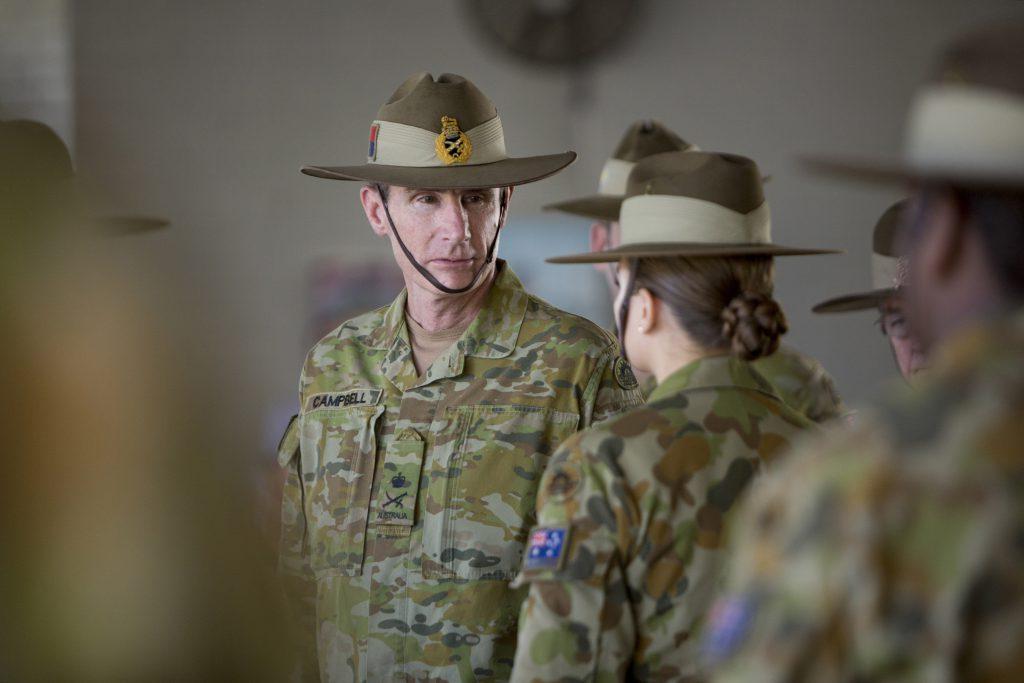
Lieutenant General Angus Campbell has delivered a strong and very public warning to ADF members not to engage in domestic violence. In an address at the National Press Club in Canberra, the army chief made it clear that an ADF member who was named as the respondent on a protection order could expect to face immediate action by the military authorities.
‘He or she must notify their commanding officer in writing as soon as possible, but no later than 24 hours after becoming aware that they are subject to a protection order’, he said. ‘As an initial step, their commanding officer is then expected to immediately restrict the member’s access to weapons.’
The army, navy and air force exist for the lawful, disciplined use of violence to defend Australia and its national interests, Campbell said. ‘The ill-disciplined and illegal use of violence on operations is a war crime. At home it’s a crime.’
The army chief said that today’s Australian soldiers are the most lethal this nation had ever fielded. They have each been given the skills, knowledge, weapons and communication systems to kill Australia’s enemies more assuredly than any preceding generation. ‘This is the grim reality of what’s known as the science of war’, he said.
‘You won’t be a soldier in whose hands I place such lethality, if you don’t live by Army’s values—courage, initiative, respect and teamwork. Always. When you’re scared, exhausted, confused and your mates are dead, our weapons won’t discriminate the innocent from the enemy combatant. You will.’
Success in battle requires great self-discipline and a willingness to sacrifice for others, Campbell said.
‘The journey of self-discipline starts at home, not in the heat of battle’, he said. ‘When one of my people engages in the illegal and ill-disciplined use of violence at home, in training or on exercise, my confidence in them to execute their duties lawfully and discriminately in circumstances of immense stress on the battlefield is deeply undermined.’
‘They are not living by Army’s values’, he said. ‘I see cowardice not courage, comfortable habit not the initiative to break the cycle, I don’t trust them to respect the innocent, the weak and the wounded, nor to serve the team rather than themselves.’
Perpetrators of family and domestic violence are fundamentally at odds with the meaning and profession of Australian soldiering, he said. ‘This is why family and domestic violence is a war fighting capability and workplace issue. And why addressing it is a necessary part of our continuing work. The fight against family and domestic violence is about living the Army’s values. And of course it’s also the right thing to do, for any citizen of Australia.’
Campbell said that last week he was surprised to read incorrect media reports saying that the army had stopped recruiting men. ‘We haven’t.’ He said that on Friday he reviewed the graduation of the army’s newest infantry soldiers at the School of Infantry, Singleton. Nineteen were men and two were women.
‘To put things into perspective, in the 2016–17 financial year, 670 men and 23 women entered our 1st Recruit Training Battalion, at Kapooka, seeking to qualify for service in the infantry. Six hundred and seventy men and 23 women does not a revolution make.’
Campbell said that he does want to see more women and more Indigenous Australians serving in the army, and more culturally and linguistically diverse Australians. ‘I want the best and most talented Australians to serve their nation in their Army. And to get the best, I need to draw from the widest breadth of our nation.’
Campbell played a video titled Silence Is the Accomplice, produced by the army earlier this year, which gives accounts by four soldiers of their experience of domestic violence. ‘Our aim in producing the video was to raise awareness of the impacts of family and domestic violence on individuals, their families and the Army as an organisation’, he said. The video has been viewed more than 49,000 times on Facebook.
In 2016, Campbell ordered everyone in the army to watch the Four Corners documentary ‘Hitting home’ (about domestic violence) and to take part in a moderated discussion about it. ‘It showed the effect that family and domestic violence, and its consequences, have on the wider community in which the Army is a significant national institution’, he said.
The army is a very big ‘human organisation’, Campbell said. ‘By definition, then, we are imperfect and flawed. Working to stop family and domestic violence not only makes us a better army, it makes us better Australians.’